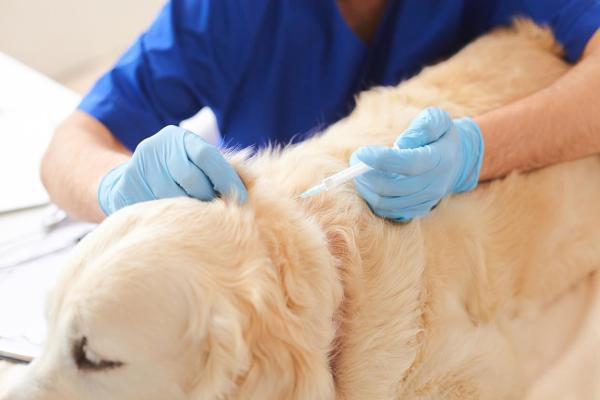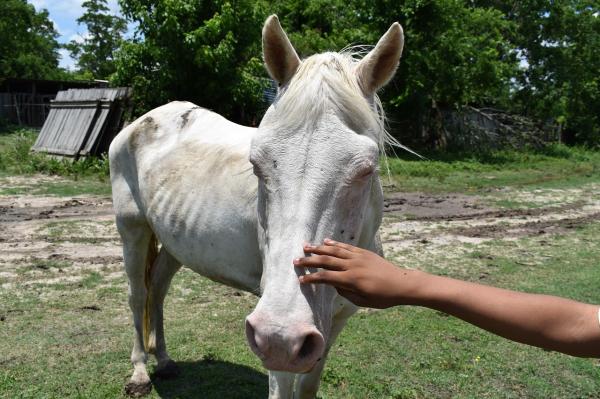Catosal for Dogs and Cats


Catosal is a vitamin B12 medication for veterinary use that can be prescribed for animals of different species, such as dogs or cats. It is also used for livestock such as cattle and horses, although its use always needs to be at the discretion of a qualified veterinarian. It is an injectable drug that has numerous applications.
In this AnimalWised article, we discuss Catosal for dogs and cats. We find out about its veterinary uses, dosage and potential side effects, as well as any contraindications it may have for your cat.
What is Catosal?
Catosal for animals is a pink injectable solution composed of two active substances, which are butaphosphan (an organic phosphorus compound) and cyanocobalamin, the latter being a common form of vitamin B12. The action of this product is physiological since its components are involved in numerous metabolic processes.
Catosal is suitable for use in different species, such as dogs, cats, horses or cattle. This includes young animals such as foals and calves. It allows various forms of administration, such as intravenous, subcutaneous or intramuscular injection. In any of these cases, the veterinarian will have to administer it directly or, if necessary, they will explain to us how and where we should inject it at home and how we will have to store the product. Catosal is sold in 100 ml bottles and expires after 28 days.
Learn about administering injections to animals with our article on how to give a dog a shot under the skin.
Catosal for dogs
Catosal is one of the veterinary medications that professionals can use to treat our dog if it is in certain circumstances. You should know there is no specific Catosal for dogs medication, but rather the same Catosal product for animals is valid for different species.
The veterinarian can choose this drug when he confirms or suspects that the dog has a vitamin B12 or phosphorus deficiency or an extra contribution is required, since these are the active substances in Catosal. In this way, the gap would be covered or these elements would be reinforced.
Not all vitamins are beneficial for all dogs and their use greatly depends on the individual. We explain more with our article on whether vitamin B complex is good for dogs.
Catosal for cats
As in the case of dogs, Catosal for cats may also be prescribed, as long as the veterinarian decides it is useful. We cannot administer Catosal on our own to our feline. Its action is the same as that indicated for dogs, meaning it covers any deficiencies that are found or suspected or improves the supply of vitamin B12 and phosphorus.
Catosal for other animals
In addition to its use in cats and dogs, Catosal for animals can also be used for other animals, often for livestock such as horses or cattle. Catosal for horses is used in the same cases as those described in dogs and cats, i.e. to recover from phosphorus or vitamin B12 deficiency. It is also used specifically in livestock to treat lumbago, i.e. lower back pain.
Catosal for cattle is used in cases in which the veterinarian diagnoses a metabolic disorder before, during or after labor. An example of such a disorder is ketosis, the consumption of fats to obtain energy due to a lack of carbohydrates. Another example is puerperal paresis or hypocalcemia, i.e. a low level of calcium in the blood.
Always under veterinary supervision, Catosal can also be administered to other animals, such as sheep, goats, pigs or birds. It can be given to birds diluted in drinking water.
What is Catosal used for?
We have already mentioned that Catosal is used to treat phosphorus and/or vitamin B12 deficiency. However, the lack of vitamins and minerals that we have pointed out can be associated with multiple disorders. The veterinarian will prescribe Catosal when our animal is in situations that include:
- Acute and chronic metabolic alterations
- Weakness
- Diseases triggered by bacterial toxins
- Anemia
- Malnutrition
- Developmental problems
- Liver pathologies
These are the general uses of Catosal in dogs, cats and other animals. However, it is very important to know that Catosal is not used everywhere in the same frequency. It is not a commonly used drug in the United States, although it may still be prescribed where available. It does not yet have FDA approval as it has not yet been investigated by this governing body, but this is the case with many veterinary drugs.
Catosal dosage for animals
The dose of Catosal is determined by the veterinarian based on the weight of the animal. Whenever possible, it is advisable to weigh them before deciding on Catosal dosage. The Catosal dose for dogs and cats is estimated to be between 0.1-0.15 ml per kg of weight. The veterinarian who will prescribe the exact dose depending on the individual. As for cattle and horses, dosage varies depending on their age, i.e. whether young or adult.
In general, one injection of Catosal can be administered per day for three days in a row. Again, it will be the veterinarian who decides the most appropriate treatment administration for each specimen according to their specific circumstances and needs. Whether it is an acute or chronic disease is another important factor. If after treatment with Catosal we do not observe any improvement, we should inform the veterinarian.

Side effects and contraindications of Catosal for dogs and cats
Catosal for animals cannot be administered to animals that have previously shown any hypersensitivity reaction to this drug or to any of its active substances or excipients. Apart from this precaution, Catosal does not present any adverse effects and there are no known interactions. If they do have an allergic reaction it is possible the cat or dog will enter anaphylactic shock.
If an overdose occurs, when the injected amount multiplies the recommended amount by five, a local reaction may occur at the point of inoculation when it is subcutaneous. This is a temporary reaction. If we detect any abnormal effect in our animal after administering the drug, we must notify the veterinarian.
As we can guess from the use of Catosal that we have indicated in the case of cattle, which was prescribed for certain problems before, during and after calving, it is a drug suitable for use in pregnant or lactating females.
Learn more about the veterinary administration of vitamins with our article on vitamin K for dogs.
This article is purely informative. AnimalWised does not have the authority to prescribe any veterinary treatment or create a diagnosis. We invite you to take your pet to the veterinarian if they are suffering from any condition or pain.
If you want to read similar articles to Catosal for Dogs and Cats, we recommend you visit our Medicine category.






